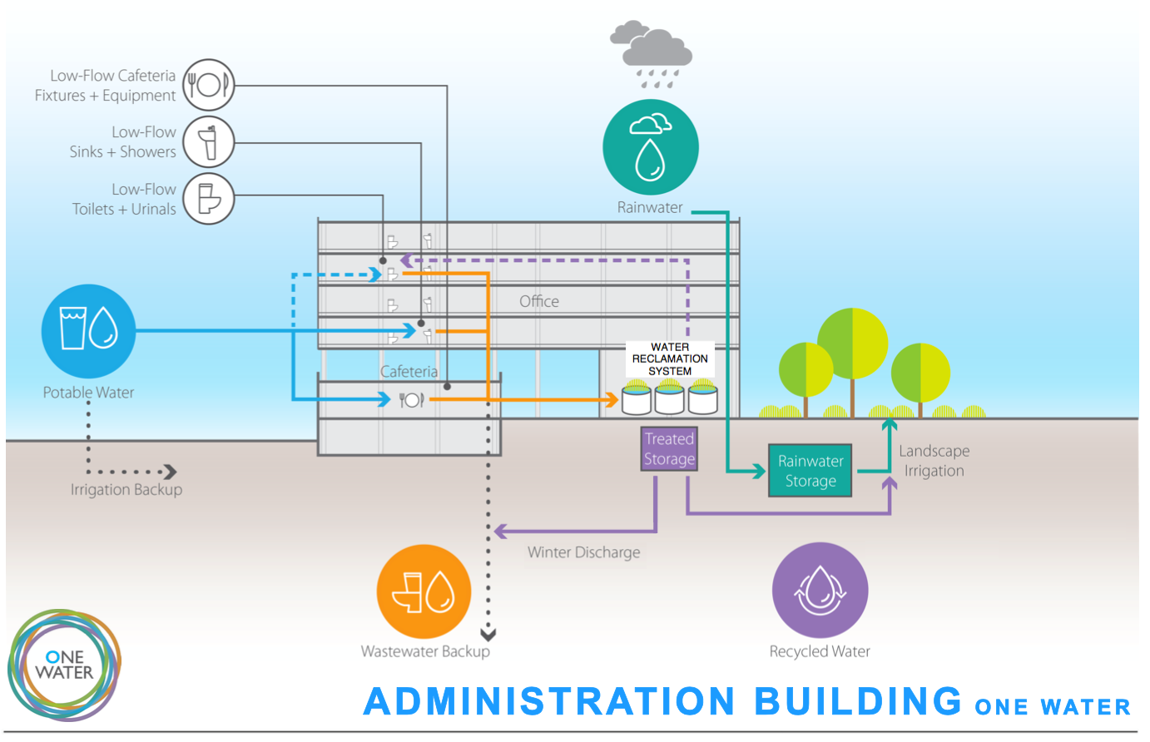
How much water will we need in the future? Just One Water
At Denver Water, we certainly wouldn’t fix a main break with duct tape and chewing gum. And we don’t store our water supplies in a portable backyard swimming pool.
Those examples may seem silly, but they highlight the importance of putting the right tools to the right use.
And that’s the guiding principle behind a concept called One Water. Quite simply, it’s using the right water for the right use.
“One Water is an integrated way to manage our water resources for long-term resilience and reliability,” said Abbey Antolovich, water efficiency and reuse manager at Denver Water. “It’s a holistic approach to the urban water cycle, where we match the type of use with the right water source. It may sound simple, but just like the laws that govern our water, it’s actually more complex.”
Just like there are different ways to use water, there are different types of water quality, too. Denver Water mainly provides potable water, or water suitable for drinking, for homes and businesses throughout the metro area. This water has been cleaned at one of our water treatment plants to comply with drinking water regulations.
But many large water users, like parks, golf courses and industrial facilities with cooling towers, don’t need drinking water quality for their operations. These users present great opportunities to put alternative water supplies to work.
“One of the main benefits of One Water is that it’s flexible and provides a common approach to develop project-specific solutions,” said Jeff Tejral, water efficiency manager at Denver Water. “A One Water project may include different components, like recycled water, gently used water from sinks, showers, tubs and washing machines, or rainwater harvesting, depending on the site-specific needs. This allows users flexibility to create customized projects based on local needs.”
According to Antolovich, one of the most visible applications of One Water to date has been Denver Water’s recycled water system.
“Denver Water takes water that has been used in our homes, cleaned at a wastewater plant so it is safe to reintroduce back into the environment, and cleans that water again to a non-drinking water standard,” she said. “We deliver that water to customers like Denver Parks and Recreation for irrigation of parks and golf courses. And our biggest recycled water customer, Xcel Energy, uses the water in its cooling towers.”
Recycled water provides many benefits, such as delaying the time required to develop new mountain water supplies, recycling nutrients and offering a lower-cost alternative to Denver Water customers that do not need to use drinking water for their operations.
But that’s just the beginning.
“There are a number of urban developments that will use a One Water approach, including the National Western Center site and Sun Valley Eco District,” Antolovich said. “This represents a significant shift by considering water management throughout the project development cycle and recognizing water as a critical element of any new development. One Water will also play a prominent role in our redeveloped Operations Complex, where we will put different types of water to the best use.”
To create a One Water site, Denver Water is blending new and old strategies, including high-efficiency plumbing fixtures, water-wise landscaping, a water-efficient café, bioswale stormwater detention and more.
But there are potential challenges to overcome, like water laws and regulations that don’t yet allow for all the possible ways to reuse water. Denver Water is actively working with regulators and lawmakers to remove those barriers.
In Denver, there are also institutional barriers to One Water implementation. While Denver Water provides drinking water and recycled water, other entities, such as Mile High Flood District and Metro Wastewater manage other water sources like stormwater and wastewater.
“One Water provides us with the opportunity to develop partnerships with other providers we may not have collaborated with in the past,” said Antolovich.
Of course, planning a sustainable water supply for a major metropolitan area like Denver is huge task. And it will require multiple solutions. But One Water represents one path forward toward that sustainable future.

